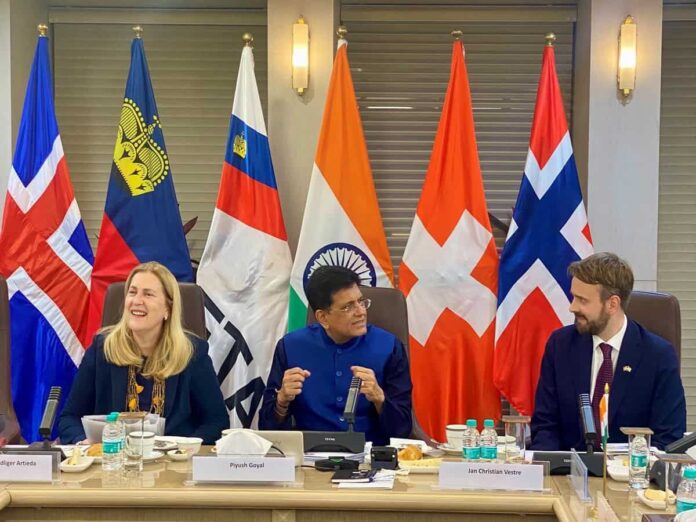By News365 Times Bureau
New Delhi, September 30, 2025 – The India–European Free Trade Association (EFTA) Trade and Economic Partnership Agreement (TEPA) will officially come into force on October 1, 2025, marking a landmark moment in India’s trade diplomacy.
Signed in March 2024, TEPA is India’s first free trade agreement with four developed European nations—Switzerland, Norway, Iceland, and Liechtenstein. It sets a binding commitment of $100 billion in foreign direct investment (FDI) and the creation of 1 million direct jobs in India over the next 15 years .
Key Highlights
- Historic Investment Promise: EFTA states will channel $50 billion in FDI in the first 10 years, followed by another $50 billion in the next 5 years. This commitment excludes portfolio investments, focusing instead on long-term capacity building in India.
- Job Creation: The deal is expected to directly generate 1 million jobs in India, especially in sectors like precision engineering, renewable energy, healthcare, and digital innovation.
- Services Boost: With stronger commitments in over 100 sub-sectors—including IT, education, audio-visual, and business services—India’s services exports are poised for major expansion.
- Professional Mobility: Mutual Recognition Agreements (MRAs) will allow Indian professionals such as nurses, architects, and chartered accountants to access EFTA markets more easily.
- Market Access: EFTA has offered tariff elimination on 92% of tariff lines, covering 99.6% of India’s exports, while India has safeguarded sensitive areas like pharma, dairy, coal, and processed food .
Sectoral Opportunities
- Agriculture & Food: Duty elimination on basmati rice, guar gum, mangoes, grapes, cashews, and confectionery will boost India’s agri-trade share in Europe.
- Marine Exports: Indian shrimps, prawns, and fish feed will enjoy tariff-free access in Norway, Iceland, and Switzerland.
- Textiles & Engineering: Apparel, machinery, and electronic goods are set to gain significantly from reduced compliance barriers.
- Coffee & Tea: With zero import duty, India’s premium shade-grown coffee and hand-picked teas can position strongly in Swiss and Norwegian markets.
- Chemicals & Pharmaceuticals: Tariff elimination on 95% of exports ensures a wider market, while India’s concerns on patents and generics have been protected .
Sustainability & Skills
TEPA is not just about trade—it also stresses sustainable development, inclusivity, and technology transfer. It promises:
- Access to advanced technologies in renewable energy, health sciences, and R&D.
- Support for vocational training and skilling initiatives, empowering India’s young workforce.
- Streamlined processes through a newly set up India–EFTA Desk, serving as a single-window channel for investments and partnerships.
Why It Matters
This agreement complements India’s Make in India and Atmanirbhar Bharat missions, while strengthening ties with Europe’s economic powerhouses. By combining trade liberalization with investment guarantees and employment generation, TEPA sets a “model FTA” framework for India’s future global trade negotiations .
The India–EFTA TEPA is more than just a trade deal—it’s a strategic leap for India’s economic future. With assured investments, expanded exports, and new professional avenues, the pact symbolizes India’s readiness to emerge as a global manufacturing and services hub in the decades ahead.



